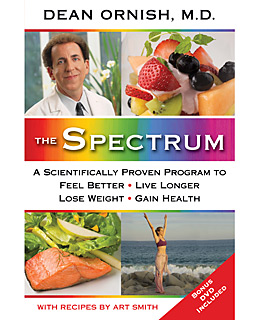Ornish Diet Review
Heart disease is the number one cause of death in both men and women in the United States today. Dr. Ornish is a well-known doctor who developed a diet program that is meant to prevent heart disease.
What Is The Ornish Diet?
In the Ornish diet, saturated fat intake is kept at or below 10% of total calories consumed per day, and dietary cholesterol intake is limited to 10mg or less per day.
The Theory Behind The Ornish Diet
Since high cholesterol levels have been linked to an increased risk for heart disease, the Ornish diet only allows for a very small amount of animal foods, which are typically high in cholesterol.
Even though eating cholesterol doesn’t always equate to high cholesterol levels, the connection between saturated fats and cholesterol has been found, so foods like beef, pork, and lamb are not consumed. Fish, skinless chicken, egg whites, and nonfat dairy are allowed, although only a limited amount is allowed.

Is The Ornish Diet Similar To Vegetarian?
If followed to the tee, the Ornish diet will seem vegetarian. It is similar to what some refer to as a “flexitarian diet”, which means a mostly vegetarian diet with a small amount of meat and other animal products. However, this “flexitarian” diet allows more fat in the diet.
Dr. Ornish’s book, “Eat More, Weight Less” is what sparked the Ornish diet. His latest book, “The Spectrum” uses this diet to help readers get healthy, lose weight, feel better, and live longer.

Prevent Heart Disease, Don’t Reverse It
One thing Dr. Ornish really believes in is the idea that it is more difficult to reverse heart disease than it is to prevent it. Making nutritional choices that promote your overall health is the best way you can prevent heart disease.
This is why his diet plan is meant to help you make the proper nutritional choices based on your health, your goals, and your risks. Those who want to improve their health and reduce their risk for heart disease can follow the Ornish diet. On the other end of the spectrum (like the name of Dr. Ornish’s new book), dieters are free to browse the other side of the diet world, although they are doing so at their own risk.
Vegetables are the Key to Success
While the Ornish diet may be an excellent heart-healthy diet, the rules can be difficult to follow. If you are truly a meat lover, then this diet is going to be difficult for you to follow.
The only real meat that is allowed is fish or skinless chicken, provided you can limit the amount you eat. That is essentially the only type of meat you are allowed to eat under the Ornish diet though.
Dr. Ornish stresses that no food group is entirely eliminated, but that the best foods for you will lack saturated fat and cholesterol. Besides limited fat and animal products, the Ornish diet does restrict sugar, sodium, and caffeine intake – besides what is naturally found in green tea.
So what do you get with the Ornish diet? Basically, your diet will look like this:
— Whole Fruits And Vegetables
— Whole Grains
— Legumes (at Least One Daily Serving Of Soy)
— Nuts And Seeds
— Alcohol (in Moderation)
— Green Tea
Does the Ornish Diet Work for Weight Loss?
The true focus of this diet is to make smart food choices, so counting calories or paying strict attention to portion sizes it’s exactly a focal diet.
This is another reason why the Ornish diet is not intended for weight loss – and is instead of more of a lifestyle diet.
Stanford researchers compared to Ornish diet to the Atkins diet. Participants on the Ornish diet dropped an average of around 5 pounds over a 12-month time period, and by the end of the study was completed, most women upped their fat intake to about 30%. However, women on the Atkins diet were down 10 pounds, and nearly all the women stayed true to the diet.
So while the Ornish diet isn’t great for weight loss, it is an excellent diet to lower LDL cholesterol. A recent study found that the Ornish diet could reduce LDL cholesterol by about 37% of the course of a lengthy period of time. Researchers noted the most challenging aspect of the diet is sticking to it long-term, although they noted that long-term use could be a great way to reduce the risk for heart disease.
Tying Everything Together
The Ornish diet isn’t just about food, it’s about moving towards a lifestyle that improves your overall health and one that expands your lifespan.
Although the plan primarily focuses on nutrition, diet does play a role – albeit a small one. Bumping up activity levels to at least 20 to 30 minutes a day is beneficial and has been proven to reduce the risk for heart attacks. Since most people are attempting to reduce their risk for heart disease while on the Ornish Diet, increasing activity level makes perfect sense.
You don’t need to run a marathon every week or anything, but simply adding some extra physical activity can go a long way to improving your fitness level, managing your weight, and reducing your risk for heart disease.
The Ornish diet is one of the more difficult diets to follow, and that is its’ main drawback. It is not right for everyone, but for those individuals with a family history of heart problems, it may be a good diet to consider to reduce the risk for heart problems down the road.









